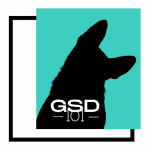Allergies can be a huge problem for German Shepherds. It can cause them to scratch and chew on themselves, become itchy and uncomfortable, and have skin irritation. Not only can this cause them discomfort, but it can also lead to discomfort, distress or even serious health issues. Managing allergies in GSD can be a lifelong process for some owners, but there are ways to help your pup get relief.
German Shepherd dogs need a combination of treatments to help with allergies from food, the environment, or items they come into contact with. These treatments include over-the-counter and prescribed medications, natural remedies, more stringent cleaning routines, changes in diet, frequent baths, more stringent cleaning, and avoiding allergens.
With the right blend of care and attention, you can help your German Shepherd get back to feeling healthy and happy.
What are the signs of dog allergies in German Shepherds?
There are many symptoms of allergies in German Shepherds. Allergies can affect the function of every system in your dog’s body. They are really uncomfortable for your GSD, so it is important to be able to identify common symptoms. The most common symptoms of dog allergies, according to PetMD are the following:
- Chronic ear infections
- Hot spots (painful, red infected skin)
- Red eyes
- Gastrointestinal symptoms, such as frequent diarrhea, passing gas, and vomiting
- Increased salivation
- Coughing
- Excessively licking themselves
- Smelly feet
- Constant scratching
- Hair loss
- Skin irritation
If you suspect your dog has allergies, it is important to get your pet treated. Allergy symptoms can lead to secondary infections and constant pain and discomfort for your GSD.
Is it common for German Shepherds to have allergies?
German Shepherds commonly get skin allergies. Their thick, double coats are the culprits. These beautiful coats provide much-needed protection against the elements for these working dogs, but there is a trade-off. These thick coats not only keep the weather out, but they also keep irritants close to your dog’s skin.
Allergies are an extreme response of the immune system to something. GSDs are prone to genetic skin allergies, such as Canine Atopic Dermatitis. They tend to have reactive immune systems.
Your dog can develop an allergy at any point in their lives. Yet, they typically develop when your German Shepherd is between 1 – 5 years old.
What types of allergies can German Shepherds get?
Allergies fall into three main categories: food, environmental, and contact. An allergen is what causes your dog’s immune system to react. There are many allergens that can affect German Shepherds, but some are more common than others.
| Type of Allergy | Common Allergens | Common Symptoms |
| Food Allergies | Dairy Beef Chicken Chicken eggs Soy Wheat gluten | Itchy skin, paws, ears Vomiting Diarrhea Gas Stomach discomfort |
| Environmental allergies | Pollen Fungi Dust mites Animal dander Air pollutants | Itching and scratching Hives Ear infections Sneezing Runny eyes Hair loss |
| Contact allergies | Plants Laundry detergents Fleas Ticks Certain types of fabric such as nylon or cotton | Rash Hot spots Red, irritated skin Coughing Difficulty breathing |
Food Allergies
Food allergies are when your dog’s immune system sees an ingredient one would normally tolerate fine as a threat and produces antibodies in response. This can cause symptoms of an allergic reaction, such as diarrhea or skin irritation. This can be very uncomfortable for your dog.
According to the vets at VCA Animal Hospitals, “The most common food allergens in dogs are proteins, especially those from dairy, beef, chicken, chicken eggs, soy, or wheat gluten.”
Every time they come into contact with a certain food, they will have symptoms.
To learn more about dog food allergies, watch this video.
Environmental Allergies
German Shepherds can also be allergic to environmental factors. The most common environmental allergens are the following:
- Pollen
- Fungi
- Dust mites
- Animal dander
- Air pollutants
These are some of the most tricky allergies for your GSD to have because he needs to have his time outdoors, running and playing, so you can’t eliminate the source.
Many times, these irritants can be seasonal, such as in the case of pollen. Your GSD may only be bothered when a certain type of plant is in bloom. Others, such as dust mites and dander, can be year-round.
Contact Allergies
Contact allergies are when your German Shepherd physically touches something that causes an allergic reaction. This usually develops over time. Your dog keeps coming into contact with something and eventually its body develops an immune response against it. Other German Shepherds can be born with contact allergies.
Many contact allergies are caused by parasites such as fleas and ticks. GSDs are usually allergic to the proteins in the parasite’s saliva. These types of allergies are usually worse in the summer months when fleas are most active. Older dogs tend to develop allergies to parasites more often than younger dogs because their immune systems weaken as they age.
Laundry detergents used on dog bedding can also cause irritation. Dogs, like humans, can develop allergies to certain fragrances and chemicals found in certain cleaners. If your dog is coming into contact with these irritants, it can cause symptoms.
What is the most common allergy in German Shepherds?
The three most common allergens for German Shepherds are:
- Flea allergy
- Beef and chicken
- Seasonal pollen.
Flea allergy dermatitis (FAD) is a severe allergic reaction to the bite of a flea. It is caused when a flea goes to feed on your dog’s blood. They do this in order to reproduce. When they feed on your dog, they inject a small amount of saliva into your dog’s bloodstream. This can cause your dog’s immune system to respond by producing antibodies.
Beef and chicken are common ingredients in commercial dog foods. Your dog becomes allergic to these proteins usually because of genetic factors.
Seasonal pollen is caused by the reproductive cycle of plants. When plants reproduce, they emit pollen, which is carried in the wind and deposited on your dog’s fur and inhaled in through its nose. Like humans, dogs can have strong immune responses to pollen.
How are German Shepherds diagnosed with allergies?
Since there are so many different causes of allergies in GSDs, your vet will want to test your German Shepherd to find out exactly what is causing his allergy symptoms. These tests are usually pretty painless for your dog.
Blood test
One way vets test for allergies is through a simple blood draw. The blood is screened for reactions to common allergens, mainly pollens, molds, and dust. These tests are less accurate for contact and food allergies.
Skin test
Intradermal skin tests are the most accurate type of testing for allergies. This test is similar to the skin tests human undergo when finding out what they are allergic to.
The dog is sedated and an area is shaved so that the skin is exposed. Then, a small amount of an allergen is injected into the skin. The injections are done in a set pattern. A few hours after the injections, the skin is looked at again. If there is a raised area where a certain allergen was injected, the dog is diagnosed with an allergy to that substance.
At-home tests
There are at-home saliva or hair tests you can administer to your dog. You can order these online from places such as EasyDNA. These tests claim to test for all of the major types of allergies.
The kit will include items to help you obtain a sample of saliva or hair from your dog. Then, you will seal it in the included tube and mail it back to the company. You will get the results back in a few weeks. Then, you can discuss the results with a vet.
How are German Shepherds treated for allergies?
First of all, you should help your dog to avoid the cause of his allergies. Once you have done all you can to eliminate the cause, your vet may prescribe allergy relief medication and steroids.
They may also need to treat any secondary infections caused by allergy symptoms, such as ear or skin infections.
Can you give a German Shepherd over-the-counter allergy medicine?
You should always consult your vet before giving your German Shepherd any over-the-counter medications. However, according to the American Kennel Club, “Benadryl is a great medication for use in dogs with mild-to-moderate allergies. Seasonal allergies, food allergies, environmental allergies, and allergic reactions to snake and insect bites all respond to Benadryl in most cases.”
Benadryl can cause drowsiness in your dog. Also, if symptoms don’t clear up after 24 hours, make sure to contact your vet.
How can you treat German Shepherd allergies naturally?
If you want to treat your German Shepherd naturally, you can give your dog Wild Alaskan Salmon oil, coconut oil, aloe vera, apple cider vinegar, and oatmeal baths to help soothe your dog’s irritated skin. You can apply most of these directly to the skin to reduce inflammation.
Beware, however, that you do not apply these remedies to any open sores, as this may cause infection.
Also, although oatmeal baths are a great, natural way to soothe your dog’s skin, they can exacerbate yeast infections.
Seven ways to prevent your German Shepherd from getting allergies
There are several simple steps you can take to try to reduce your German Shepherd’s exposure to common allergens. Avoiding common irritants and increasing your cleaning routine can go a long way in preventing allergy symptoms in your GSD.
1. Change your air vent filters often
With so much going on in our daily lives, it’s easy to forget something as simple as changing an air vent filter. Yet, this simple task is powerful. Air vent filters should be changed at least every 3 months. You can buy specially formulated air vents made to trap common irritants such as pollen, dust mites, and dander.
You can’t keep your GSD for going outside, but you can filter out some of those allergens in the home. This will help reduce the amount of pollen and dander your dog comes into contact with.
2. Vacuum frequently
You should vacuum daily to reduce the number of allergens your German Shepherd comes into contact with. Vacuuming can help reduce dander, dust mites, pollen, dust, hair, and other allergens brought inside by shoes and paws.
3. Treat fleas
Since fleas are one of the most common allergens for GSDs, it’s important to keep your dog up to date on his flea medication. There are so many medications to choose from nowadays. You can give your dog a pill, or a collar, or do topical treatments. The frequency between treatments can range from 1 to 6 months, according to the type of flea medication you are using.
These medications are over-the-counter and easy to access, so set a reminder to keep these up to date.
If your dog already has fleas and you need to get rid of them, try a flea bath and comb through his thick fur with a sturdy, steel fine-toothed flea comb. This will help to eliminate the eggs of fleas and to remove any adults currently residing on your dog.
Check out this video for some tips about preventing fleas:
4. Avoid common food allergen ingredients
Once you know what type of food your German Shepherd is allergic to, it is important to eliminate those ingredients from your dog’s diet. There are many limited-ingredient dog kibbles on the market. You can also choose to feed your dog homemade or raw food diets to ensure he is not going to get exposed to a food allergen.
Also, don’t forget to check ingredient labels on treats.
5. Wipe your dog off when he comes inside
When your German Shepherd comes inside from his daily exercise, take a damp cloth and wipe off your dog. This can help to reduce the amount of pollen and outdoor pollutants your dog brings in with him. This can also keep your dog from having contact with the allergens for long periods of time.
6. Bathe your dog frequently
Another way to reduce your dog’s exposure to common outdoor allergens is by bathing your German Shepherd. It is recommended that you bathe your GSD at least once a month, but you may want to increase this to twice a month during allergy season. You don’t want to bathe your dog too frequently, or it can strip the important oils from his fur.
7. Wash dog bedding frequently
Another way to reduce allergens in the home is to wash dog bedding frequently. This will reduce any of the allergens your GSD has brought to their bed. This will also reduce the spread of fleas, which like to hide in bedding.
Conclusion
Take notice of any allergy symptoms your German Shepherd dog may be exhibiting and try to discover what is causing the allergic reaction. You may need to take your dog for allergy testing to identify the cause. If your German Shepherd has allergies, there are several ways you can reduce their exposure to common allergens, and you can start today by using some of the tips we recommended in this article.
More on German Shepherd Allergies

- Most Common German Shepherd Allergies: What You Need to Know
- How to Help Your German Shepherd With Allergies?
- Ear Allergy in German Shepherds: Everything You Need to Know
- Chicken Allergy in German Shepherds: Everything You Need to Know
- German Shepherd Skin Allergies: Best Tips for Relief
- How to Stop Itching in German Shepherds? Effective Remedies Owners Use
- You may also like:
- Is Pet Insurance Worth It for Your German Shepherd Dog?
- Is Grain-Free Good for German Shepherds?
- Worst Dog Food for German Shepherds: Things to Avoid
- Best Dog Food for German Shepherds with Sensitive Stomach
- German Shepherd with Diarrhea: A Feeding Guide
- Dog Diarrhea: Simple and Effective Home Remedies That Dog Owners Use
- Constipated Dog: Causes and Easy Home Remedies


